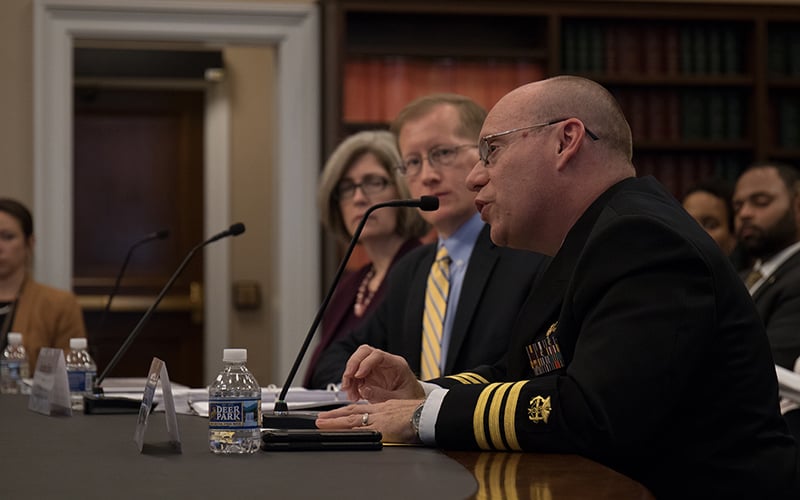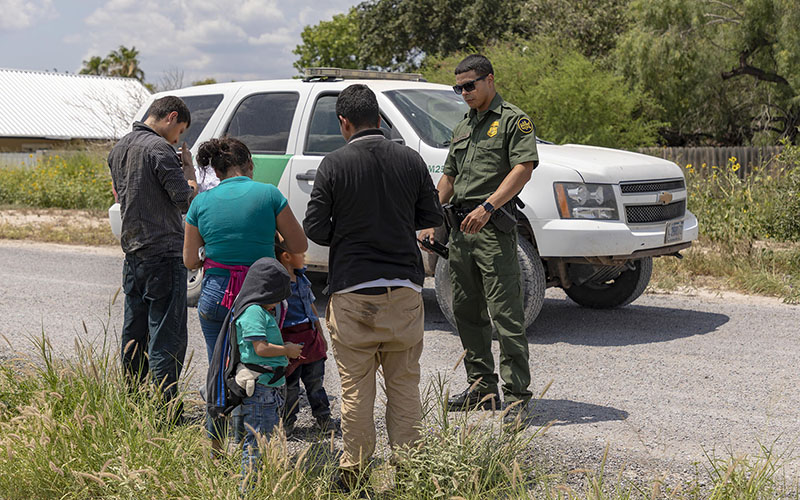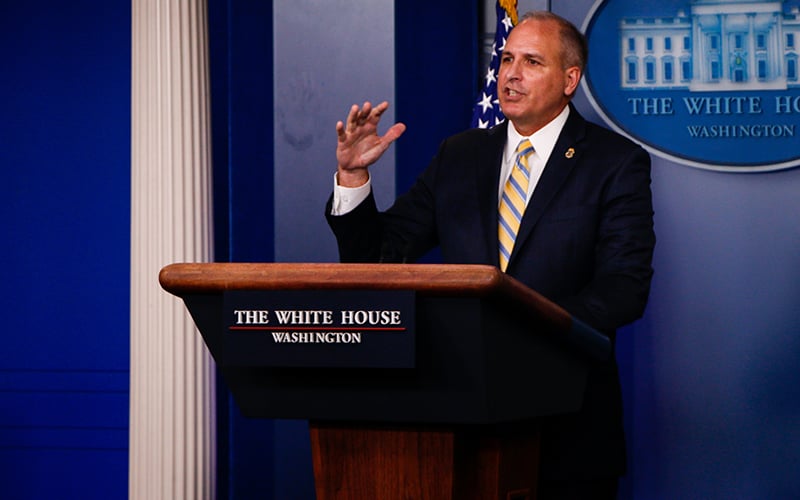
From left, Health and Human Services Assistant Inspector General Ann Maxwell, Office of Refugee Resettlement Director Jonathan Hayes and Cmdr. Jonathan White of the U.S. Public Health Service Commissioned Corps, testify about conditions at immigrant detention facilities. (Photo by Vandana Ravikumar/Cronkite News)
WASHINGTON – An inspector general’s report on the mental health of migrant children in federal detention found multiple shortcomings in how officials cared for children in custody last fall, with significant trauma and worsening mental health problems.
Four Arizona detention facilities were among those surveyed for the report, which pointed to a shortage of clinicians, including bilingual ones, and a lack of preparedness for the problems the children presented, especially those with severe post-traumatic stress disorder.
The report, presented to two House committees in separate hearings this week, brought demands that “people have to be held accountable” for what Rep. Rosa DeLauro, D-Conn., called “child abuse” stemming from the Trump administration’s immigration policies.
“It confirms our worst fears – that intentional policy choices by this administration created what I would call a mental health crisis,” DeLauro said at a House Appropriations Committee hearing Wednesday. “It is a crisis of deliberate, government-sanctioned child abuse.”
The report by the Department of Health and Human Services inspector general evaluated 45 immigrant detention facilities, about half the total in the U.S. It found that “intense trauma was common” among children who entered in fall of 2018, when the review was done.
Some children had experienced physical or sexual abuse in their countries of origin, had witnessed the rape or murder of family members, or were “fleeing threats against their own lives.” The report told of one girl held captive in her home country for months, where she was tortured and raped, eventually becoming pregnant.
The journey to escape such horrors was often no better, with children and families exposed to much of the same. That trauma could be compounded by detention, with children unprepared for sudden separation from their parents or for their new surroundings.
The report said the hectic reunification process, longer lengths of stay, difficulty transferring children in need of specialized treatment, and arrival of younger and younger children to federal custody also added to children’s worsening mental health.
DeLauro called the reported treatment of children “twisted and shameful.” She said the Office of Refugee Resettlement is not a detention agency, but a child welfare agency, “and we must be ensuring it is upholding its mission.”
One way to do that is to “take all reasonable steps to minimize the time that children remain in ORR custody,” the report said. But what exactly that meant proved contentious for committee members.
“Maybe if we actually enforced the law, we would not allow people to enter illegally with their children, which has resulted in separation,” said Rep. Andy Harris, R-Md. “I suggest maybe we do one of the simple things and maybe just agree with the president, that the border ought to be enforced, we shouldn’t have an open border.”
But Rep. Barbara Lee, D-Calif., said tightening the border will not help solve problems children face in custody, problems she attributed to Trump administration policies.
“I foresee some very difficult issues that these children are going to face as a result of the trauma they have experienced and not treating them properly,” Lee said. “How do you think someone’s going to feel at 18 years old, that they were taken from their parents and that they were treated in a way that wasn’t healthy and that we did not help restore their mental health?”
Some children in detention were already presenting such issues, said Ann Maxwell, HHS assistant inspector general for evaluations and inspections. She cited reports of children who presented “physical symptoms as manifestations of their psychological pain.”
“These children would say their chest hurts even though there was nothing wrong with them medically. One child said that every heartbeat hurts,” Maxwell said.
“Others were anxious, concerned for their parents’ safety. One 8-year-old boy, separated from his father, was under the delusion that his father was killed and that he was next. He required emergency psychiatric care,” she said.

An immigrant family turns itself in to a Border Patrol agent after illegally crossing the Rio Grande in June. (Photo by Mani Albrecht/Customs and Border Protection)
Cmdr. Jonathan White of the U.S Public Health Service Commissioned Corps said he agreed with Lee’s concerns about long-term impacts but doesn’t think the current system can address it.
“The only way to prevent that harm is to prevent separation,” White said. “I just want to speak to the reality that separation cannot be managed by a tertiary intervention strategy, only by prevention.”
Besides minimizing the time in custody, the report suggested that HHS increase treatment options, develop strategies to retain mental health clinicians working in facilities, and find ways to address trauma in short-term therapy.
Office of Refugee Resettlement Director Jonathan Hayes said the agency is trying to recruit more employees and interns at college job fairs – even though they are sometimes met by protesters – and has hired a board-certified psychiatrist to help guide treatment options.
Hayes also said facilities and services are appropriate and he claimed that children do get more comfortable once they have time to get used to their surroundings.
“We see that as they spend more time in an HHS shelter, and they’re surrounded by medical professionals and clinicians and youth care workers and other kids, their comfort level and confidence in our team does absolutely increase,” Hayes said. “That is incorporated into the clinical work our team does.
But DeLauro – citing Texas law that “defines child abuse as ‘inflicting or failing to responsibly prevent others from inflicting mental or emotional injury, impairing a child’s growth, development, or psychological functioning'” – said there is no way for detention to be good for a child.
“People have to be accountable,” she said. “Those who employed a policy that would take us in this direction have to be brought to task in some way.”

